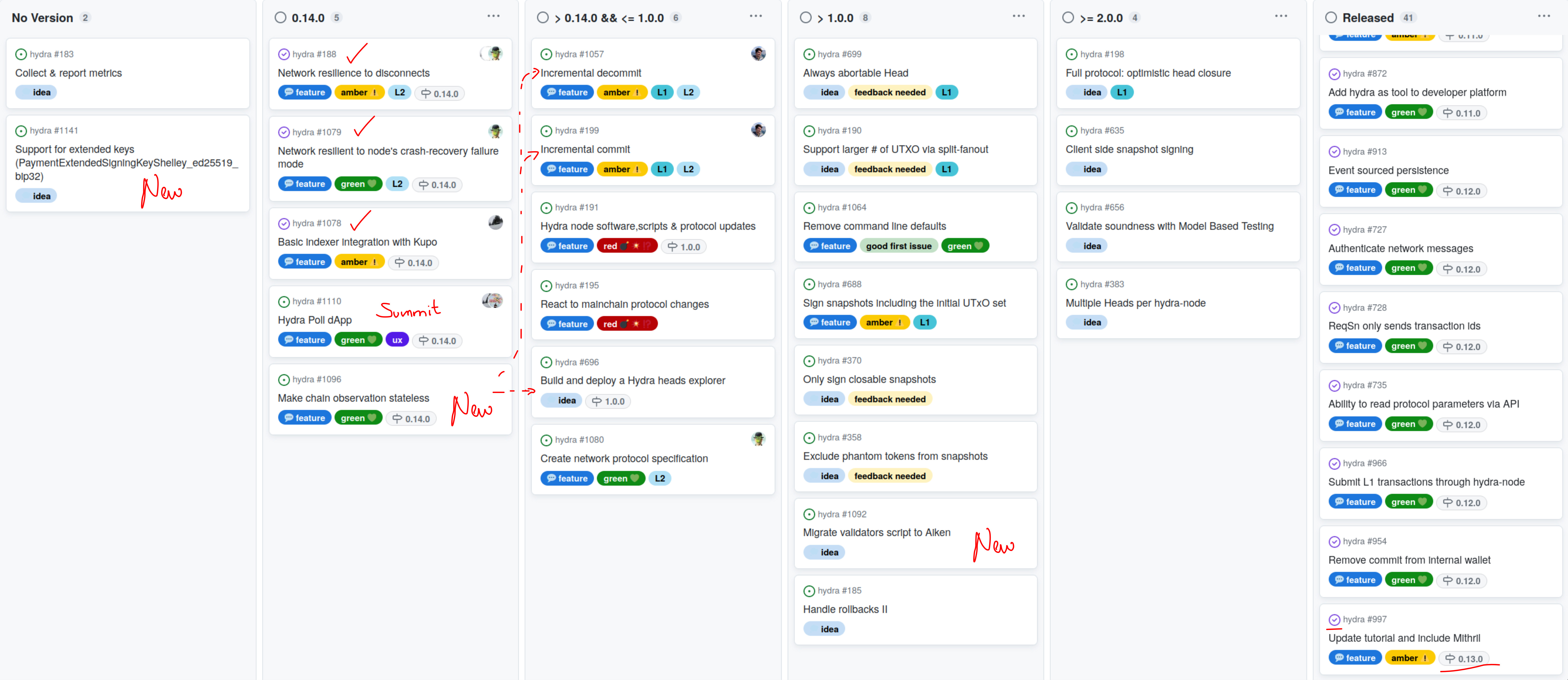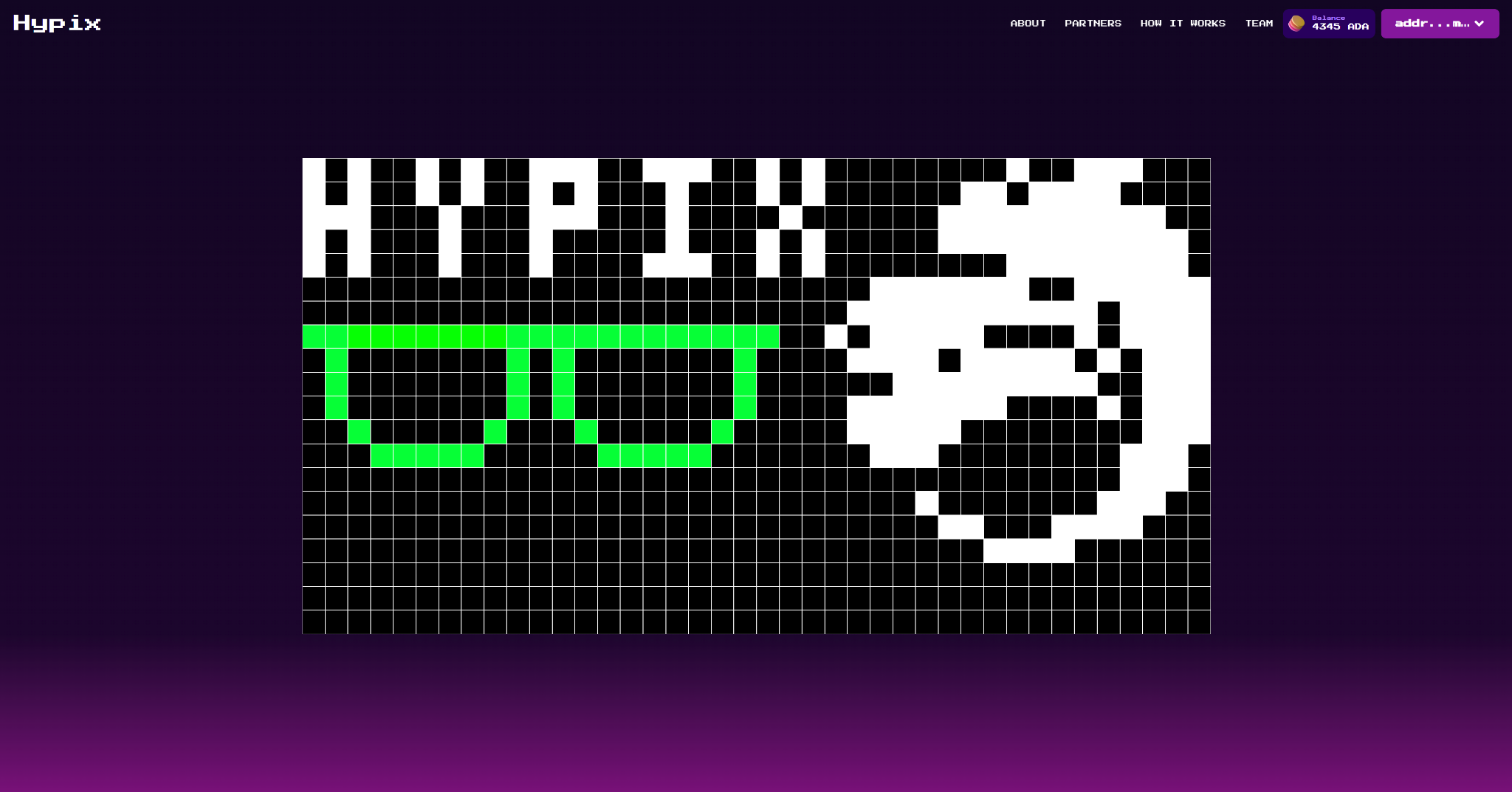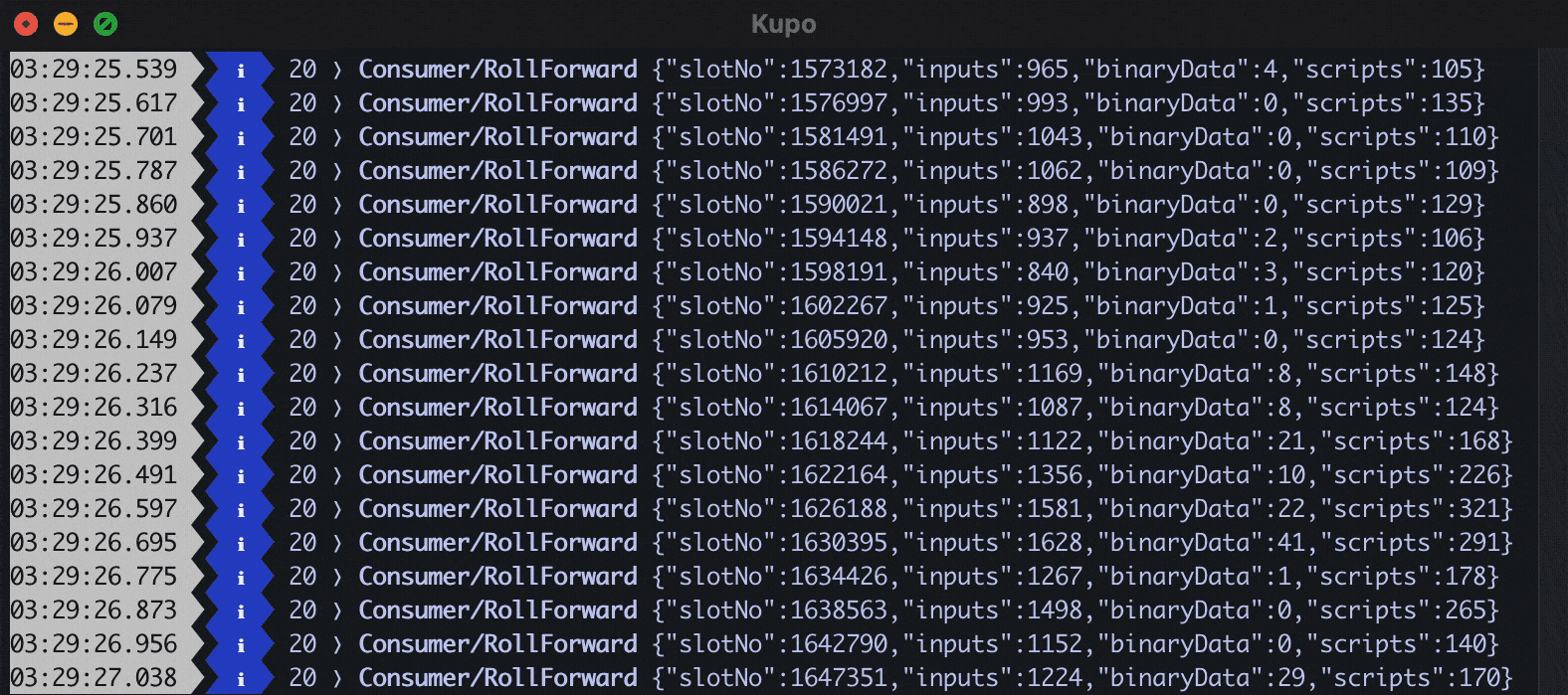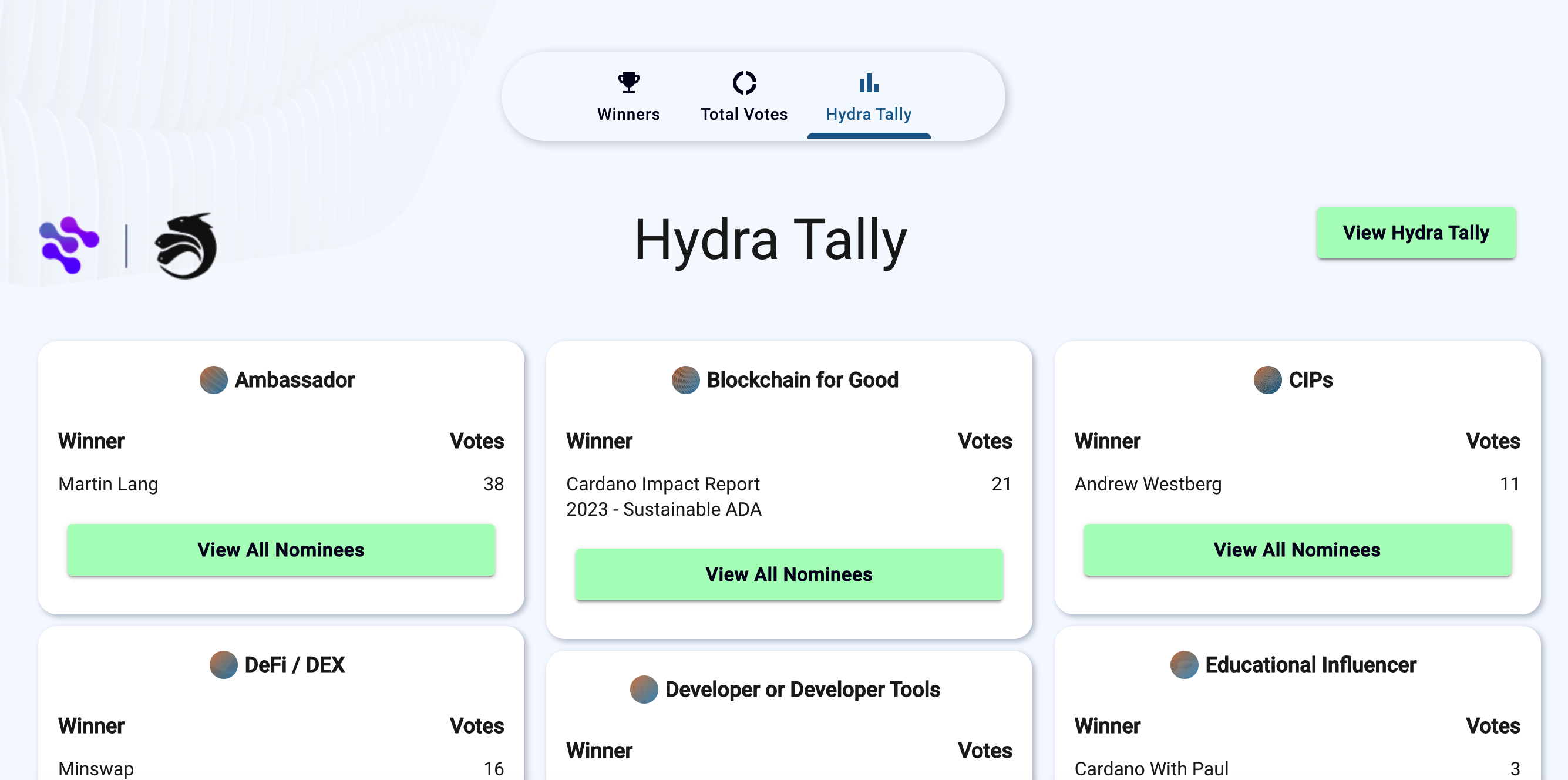This report summarizes the work on Hydra since September 2023. It serves as preparation for the monthly review meeting (see slides and recording), where the team updates project stakeholders on recent developments to gather their feedback on proposed plans.
Roadmap
This month, the team released version 0.13.0, and updated the project roadmap to include the next planned version 0.14.0:

Release 0.13.0
-
Implemented security fixes to Hydra on-chain scripts, all of which are only exploitable by other head participants (not any attacker)
-
Added support for (externally) committing inline datums
-
Improved stability by querying the
cardano-nodeat the tip -
Improved state persistence
-
See full release notes and a list of delivered features.
Notable updates
-
Moved the network resilience #188 issue out of version 0.13.0 to allow for a quick release of the security fixes. This feature has been split in two parts, both of which are completed and will soon be included in the 0.14.0 release.
-
A new user submitted a feature idea about supporting extended keys #1141. Initially urgent, it's no longer a priority and requires further clarification.
-
Although not part of Hydra version 0.14.0, the team completed the integration of Hydra support in Kupo #1078, which can already be used with Kupo version 2.7.0
-
Implemented a new Hydra Poll DApp feature, which is an example to be demonstrated at the Cardano Summit 2023.
-
Realized stateless chain observation #1096 as a dedicated feature, which will add a
hydra-chain-observertool and simplify upcoming feature implementation related to layer 1 transactions. -
Created a feature idea item to migrate all validators to Aiken #1092. This was moved to 1.0.0 though, as it would require a complete re-audit of the scripts and and there is no urgent requirement for performance improvements at this stage.
Hydra development
Issues and pull requests closed since the last report
This month, the team worked on the following:
Network resilience to node crash
Last month, the team worked on making the Hydra network resilient to transient network connectivity failure (see #188). However, this was just one aspect of the larger effort to improve the overall stability and reliability of the network. By completing #1079, the team also made the network resilient to arbitrary node failures, which is a much more likely event to happen should the network run for a significant amount of time.
Hydra nodes now persist the network messages they send to peers and together with the already present acknowledgment mechanism, this means a node recovering from a crash can resend messages which were not received by their peers.
Hydra Poll DApp
As the Hydra team seeks to adhere more to the principles of dogfooding, we wanted to upgrade our basic Hydraw application to something more interactive. We, therefore, built a poll DApp with the goal of demonstrating how one can build an application living entirely in the frontend that can interact directly with a hydra-node, using its websockets-based API. This application was also showcased at the Cardano Summit 2023, where the Hydra team delivered a masterclass.
Upgrade to GHC 9.6 & Brick 1.10
This month, we were able to update our compiler toolchain from GHC 9.2.8 to 9.6.3. This also required us to upgrade the hydra-tui from Brick 0.73 to 1.10 to stay compatible with the new version of the mtl.
The update to Brick necessitated a complete rewrite of the hydra-tui which greatly simplifies the application logic, using Brick's new elm architecture style combined with microlens-mtl.
Community update
This month, the monthly review meeting was almost completely covered by demonstrations from the various teams working on and with Hydra. Don't miss out on the demonstrations of the various community contributions and make sure to also view the recording.
Hypix
Hypix is a continuation of the 'Hydraw' demonstration the team used throughout development. The project is spear-headed by Trym Bruset and will integrate CIP-68 NFTs with instant transaction processing in a Hydra head to realize collaboratively created art pieces. The project is progressing great with an open beta available soon.

Kupo x Hydra
Indexers of chain data, like Kupo,
are useful to enable lightweight decentralized applications like Hypix. As the
application state of Hypix, for example, is not only on the Cardano layer 1, but
also in the Hydra head, Kupo was enhanced to run 'in front of' a hydra-node and
provide the same API for UTXOs indexed from a Hydra head. This was a joint
effort between
@KtorZ, @v0d1ch and
@ch1bo and has been released in version 2.7 of
Kupo.

Offline-mode Hydra node
Ledger-only mode for Hydra was one of the Catalyst Fund10 projects that got funded and work is underway to make it an integral part of Hydra software components. A new ADR has been proposed which details the rationale behind this new feature and an overview of what it brings and what impacts it will have on the hydra-node.
Moreover, this implementation is underway and should be part of the next release. This will enable running a single hydra-node as a kind of 'ledger-as-a-service', priming it with some UTXOs and allowing clients to submit and validate transactions without any relationship to layer 1.
Voting on Hydra
The Hydra-for-voting project has been started earlier this year as a proof-of-concept to explore how a Hydra Head could help improve the voting or rather tallying process for Catalyst and other large-scale on-chain decision-making process. It's been on pause for a few months due to other priorities but it's been revived recently and put to use to tally votes for the Cardano Summit's awards recipients.
This development effort led to a couple of new features and fixes:
- The ability to submit a transaction for layer 1 using 'standard' CBOR-hex format
- Upgrade to the checked-in protocol parameters used by demo network which were out of sync with the internal ledger version
- Discussion on the usage of extended payment keys in in relation to the Hydra Head protocol

ZK Snarks on Hydra
The team has initiated discussions with another funded Catalyst Fund10 project, exploring the implementation of a zero-knowledge proof system for Cardano, utilizing Hydra and ZK Snarks. At this early stage, there is minimal progress to display, but the team is eager to start the development of this promising tool.
Conclusion
The monthly review meeting for October 2023 was held on 2023-10-30 via Google Meet with these slides and the recording.
As mentioned above, the meeting was about 45 minutes of demonstrations - which clearly shows that we are in the wake of Catalyst Fund10 where several project proposals involving Hydra and Mithril got funded and at the same time everyone was preparing for the Cardano Summit 2023.
With this many community contributions and projects moving forward, there was not much time to discuss the Hydra roadmap or go into details about Mithril project status. This is great!
Besides, the project roadmaps seem to be well aligned where our next features in-line are most anticipated (incremental de-/commits) and the adoption of Mithril is showing a healthy level with clear next steps and features ahead.
It is getting increasingly hard to keep track of all the new developments around Hydra. However, that is also often not needed and the Cardano builders just set off and build things using Hydra these days.
November will start with the Cardano Summit, likely yielding even more feedback and feature ideas from users. Following this, there will be several productive weeks focused on feature development before the usual Christmas and New Year breaks across the teams.

